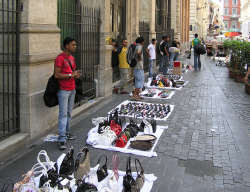Whenever I travel, I always carry a small, portable shortwave radio with me, mainly to keep up with world news, when I’m travelling through countries where English isn’t the main language. You may wonder what the point is, in this age of 24 hour BBC World and CNN satellite television – until you find yourself in a small bed and breakfast or hostel without a television, let alone a satellite receiver.
I was staying in a hostel in Florence back in March 1999, when NATO commenced its bombing campaign over parts of Kosovo and Serbia. The hostel didn’t have a TV room, and there was certainly no English programming on the radio in the city at that time; if I hadn’t had my shortwave radio with me, I probably wouldn’t have even known anything was going on, just across the Adriatic. Now, many might argue that knowing about this might not have helped me in the least – but who knows; I could well have been heading to Croatia at the time, and there’s nothing to say the NATO attacks might not have reignited the conflicts that had been going on in that area for many years.
The BBC have announced that their World Service broadcasts to Europe will close on February 18th, 2008. The World Service has been broadcasting in a number of forms since 1938, and has been one of the most reliable broadcasters of news and information programs available, and I dare say has been invaluable to many a traveller on the road in that time. Unfortunately, the BBC now expect people to hear their service via local rebroadcasts (which tend to only be available in big cities, if at all), the internet (hard to get to that when you’re on the move) or satellite radio (not exactly something you want to put in your backpack).
It’s a pity that the BBC couldn’t wait until future technologies, such as portable satellite radio, or Digital Radio Mondiale broadcasts on shortwave, became feasible, because once they have left the shortwave bands in Europe, they are going to be leaving a very big gap for the traveller in times of emergency.


Recent Comments